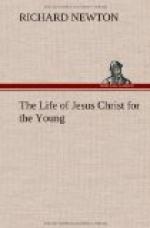And so, when Jesus went on, from the last Passover of the Jewish church, to the first sacramental feast of the Christian church, and began by saying, “This do in remembrance of me,” what else could the apostles possibly have thought, but that he intended this new service of the Christian church to be a memorial service, just as the old festival of the Jewish church had been? When he gave them the broken bread, and said, “This is my body;” they could only have understood him as meaning this is the memorial of my body. And when he gave them the cup into which he had just poured the wine, and said: “This is my blood;” they could only understand him as meaning this is the memorial of my blood. And so, the sense in which he had just before used the words employed in the Jewish festival must have led the disciples to understand them in the same way when he used similar words in the Christian sacrament. This is a good, strong reason for thinking of this sacramental feast as a memorial service.
There is indeed, one point of difference between the Jewish Passover and the Christian sacrament, when we think of them as memorial services. The Jews kept their solemn festival in memory of a dead lamb—the Passover lamb that was put to death for them, but never came to life again. We keep our Christian sacrament in memory of the Lamb of God, who died for us indeed, but who rose from the dead, and is alive forevermore. As we keep this solemn festival, we may lift up our adoring hearts to him and say for ourselves personally,
“O, the Lamb! the loving Lamb!
The Lamb of Calvary!
The Lamb that was slain, but liveth again,
And intercedes for me!”
And though they are both memorial services, yet this one thought makes a world-wide difference between them. The bread and meat which the pious Jew ate, when he kept the Passover, and the wine which he drank on that occasion, would strengthen his body, but there was nothing connected with those material substances that would do any special good to his soul. It is different, however, with our Christian festival of the Lord’s Supper. And this difference is clearly brought out in what we find in the catechism of our church on this subject. In speaking of this holy sacrament, the question is asked—“What are the benefits whereof we are partakers thereby?” And the answer to this question is—“The strengthening and refreshing of our souls, by the body and blood of Christ, as our bodies are by the bread and wine.”
Here we see that while the Lord’s Supper is a memorial service indeed, it is at the same time something more than that.
And then, the actual bodily presence of Christ with them must have compelled the apostles to understand the words he used on that occasion, in this memorial sense.




